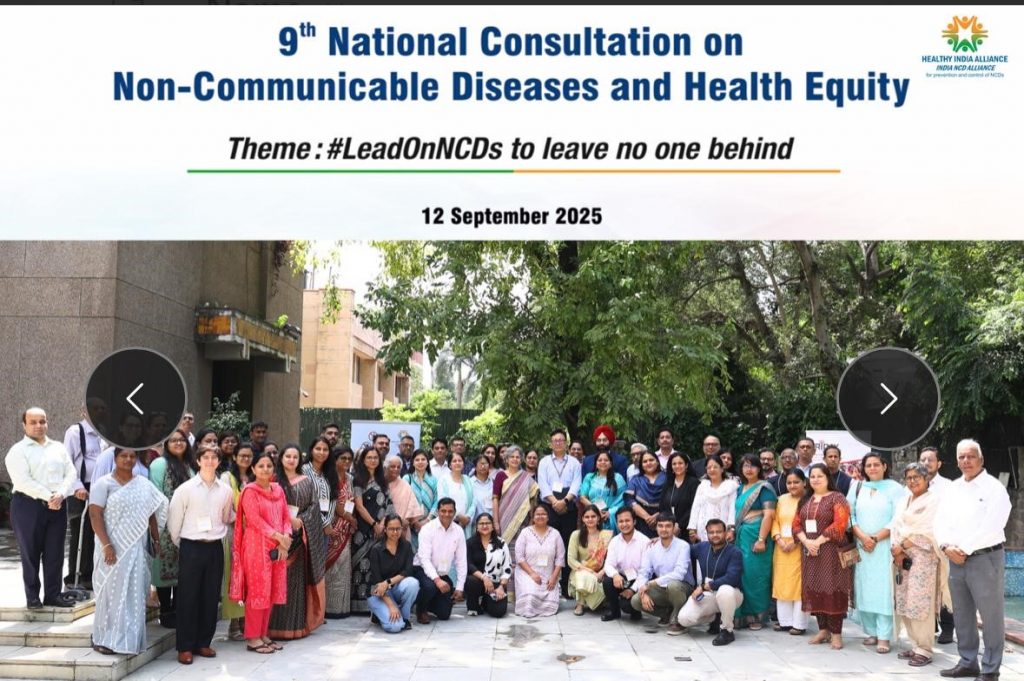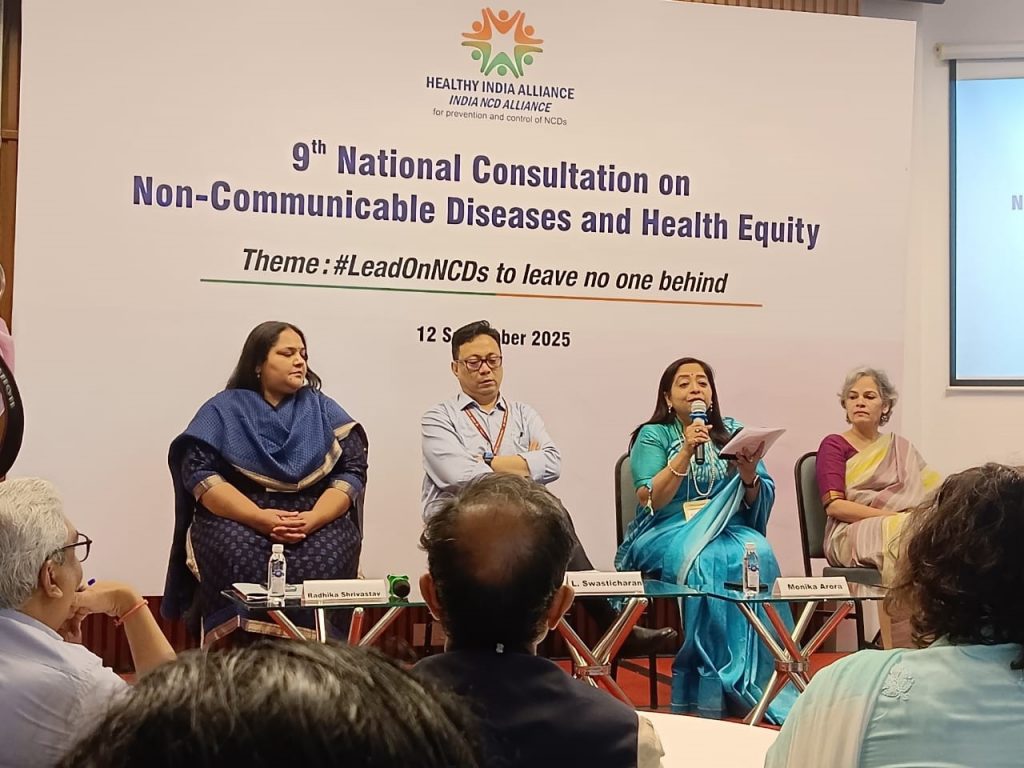Leave No One Behind: The Roadmap to Health Equity in India’s NCD Response


New Delhi, September 12, 2025 — The vital discussion on strengthening India’s battle against Non-Communicable Diseases (NCDs) took a critical turn towards social justice at the 9th National Consultation on Non-Communicable Diseases and Health Equity. Held at the India International Centre Annexe, the flagship event, organized by the Healthy India Alliance (HIA) and the Indian Institute of Public Health, Hyderabad (IIPH-H), focused on the theme: #LeadOnNCDs to leave no one behind.
The consultation brought together over 50 key stakeholders, including policymakers, civil society leaders, researchers, and lived experience champions. Attendees from Pallium India included Preeti Chauhan, Head of National Policy, and Mr. Syed Aksari from the Facilitation team, underscoring the organization’s commitment to integrating palliative care and policy advocacy into the national NCD response continuum.
Objectives
The event’s objective, as outlined by Ms. Radhika Shrivastav of HRIDAY/HIA, was to drive multi-stakeholder dialogue and co-create an actionable roadmap for an equitable response to NCDs.
Key Objectives of the Consultation:
- Foster multi-stakeholder dialogue to identify barriers, opportunities, and priority actions for an equitable NCD response through the National Programme for NCD Prevention and Control (NP-NCD).
- Co-create a community-driven roadmap for integrating an equity-focused approach and ensuring the meaningful involvement of people living with NCDs (PLNCDs).
The consultation was positioned as a crucial precursor to the upcoming 4th UN High Level Meeting on NCDs, ensuring that India’s domestic strategies are grounded in principles of equity.
Key Highlights and Evidence-Based Insights
1. The Catastrophic Burden and Report Release
A major highlight was the release of the Report on NCDs and Health Equity in India, which framed NCDs as a “social justice issue” that both reflects and exacerbates inequities by disproportionately affecting marginalized and vulnerable populations. (Access report on: https://healthyindiaalliance.org/resources/)
- Mortality and Morbidity: In 2021, NCDs accounted for 55% of all deaths and 54% of the total Disability-Adjusted Life Years (DALYs) in India, highlighting the pervasive nature of the crisis.
- Financial Strain: The economic impact is devastating for vulnerable households. Hospitalization for NCDs pushes 47% of households to Catastrophic Health Expenditure (CHE). Treatment in private facilities is particularly burdensome, leading to a higher OOPE (Out-of-Pocket Expenditure) which is about four times higher than in public facilities, pushing 66.3% of those households to CHE.
- Report Recommendations: The report’s recommendations focus on four critical sub-themes: meaningful involvement of PLNCDs, strengthening people-centred health systems, augmenting community and CSO participation, and creating a protective policy environment.
2. Deepening Inequities and Barriers to Care
Discussions and the report highlighted specific disparities, revealing which populations are most likely to be excluded from care:
- Vulnerable Groups: Inequities disproportionately affect rural residents, low-income populations, elderly individuals (nearly one-fourth affected by multi-morbidities), women, and marginalized communities, including Scheduled Tribes (STs) and Scheduled Castes (SCs).
- Systemic and Structural Barriers: Access is hampered by resource shortages in Primary Health Centres (PHCs), long waiting periods, and the financial catastrophe of OOPE. Even subsidized care is often inaccessible due to travel costs and time constraints.
- Socio-Cultural Discrimination: The assessment noted that factors like caste act as a substantial barrier to healthcare utilization. Women are disproportionately affected by NCDs and face unique barriers to access, such as heavy workloads and limited service hours, often rooted in patriarchal structures. Stigma is a major deterrent, particularly for individuals needing mental health care.
3. Focus on Equitable Access through National Initiatives
The session on the NP-NCD and the 75/25 initiative reinforced the need for a practical, equity-focused approach in implementation.
- Decentralization and Integration: There is an urgent call for decentralized and accessible NCD care at local Health and Wellness Centres (HWCs). Furthermore, effective strategies must integrate both physical and mental health services to address multi-morbidities among vulnerable groups.
- Targeted Policies: Advocating for comprehensive policies, such as affordable, disease-specific health insurance and redistributive measures, is essential to alleviate the economic impact of NCDs and ensure financial protection.

Pallium India’s Commitment to Comprehensive Care
The participation of Dr. Preeti Chauhan and Mr. Syed Aksari from Pallium India reaffirmed the organization’s commitment to ensuring that the equity lens applied to NCD care extends to the full spectrum of treatment. This includes securing equitable access to essential palliative care services for marginalized groups facing advanced NCDs, ensuring dignity and quality of life for those burdened by catastrophic health expenses and complex conditions.
The outcomes of this consultation are expected to provide a strong, evidence-based impetus for multi-sectoral action, working towards strengthening NCD prevention and control in India with a clear mandate to leave no one behind.






